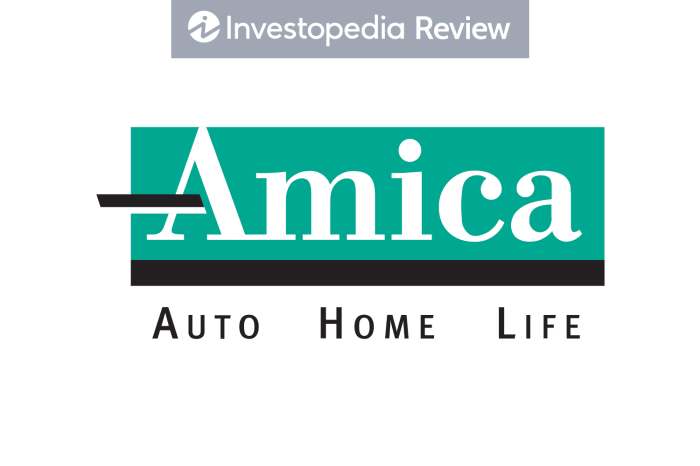
Securing your home is a significant investment, and choosing the right insurance provider is paramount. Amica Mutual, known for its strong financial standing and customer-centric approach, offers a range of home insurance options designed to meet diverse needs. This guide delves into the specifics of Amica Mutual home insurance, exploring coverage, pricing, customer service, and more, providing you with the information necessary to make an informed decision.
We’ll examine Amica’s various policy types, including homeowners and renters insurance, highlighting key features and benefits. We’ll also compare Amica’s offerings to those of its competitors, considering factors such as coverage limits, deductibles, and pricing. Our goal is to provide a balanced perspective, empowering you to assess whether Amica Mutual is the right fit for your home insurance needs.
Financial Stability and Ratings

Amica Mutual’s financial strength is a key factor for potential and existing policyholders. Understanding its ratings from independent agencies provides valuable insight into the company’s ability to meet its obligations and withstand economic downturns. This section details Amica’s financial stability and compares it to other major insurers.
Amica Mutual consistently receives high ratings from leading financial strength rating agencies. These ratings reflect the company’s strong capitalization, prudent underwriting practices, and consistent profitability. A high rating indicates a lower risk of the insurer’s inability to pay claims, offering policyholders greater peace of mind. Conversely, a lower rating might suggest a higher risk, although it doesn’t automatically mean the insurer is unreliable. It’s crucial to consider the ratings in conjunction with other factors, such as the insurer’s history and reputation.
Amica Mutual’s Financial Strength Ratings
The following table summarizes Amica Mutual’s financial strength ratings from several prominent rating agencies. Note that ratings can change over time, so it’s advisable to consult the rating agencies directly for the most up-to-date information. These ratings are typically based on a complex analysis of the insurer’s financial statements, reserves, underwriting performance, and management practices.
| Rating Agency | Amica Mutual Rating | Rating Description | Comparative Note |
|---|---|---|---|
| A.M. Best | A+ (Superior) | Indicates exceptional financial strength and operating performance. | This is among the highest ratings possible, reflecting a very low risk of default. |
| Moody’s | A1 | Represents high creditworthiness and a low risk of default. | Comparable to A+ from A.M. Best, signifying excellent financial strength. |
| Standard & Poor’s | AA- | Indicates very strong financial strength and a very low risk of default. | Similar in meaning to the A+ and A1 ratings, reflecting high financial stability. |
| Weiss Ratings | A+ | Indicates superior financial strength and operating performance. | Consistent with the ratings from other agencies, showing a strong financial position. |
Implications of Ratings for Policyholders
High financial strength ratings translate to a reduced likelihood of claim denials due to insurer insolvency. Policyholders with Amica can have increased confidence that their claims will be paid promptly and fully, even during periods of economic uncertainty. This stability is particularly important for larger claims, such as those resulting from significant property damage or liability lawsuits. While no insurer guarantees against unforeseen circumstances, a strong rating provides a significant level of reassurance.
Comparison to Other Major Insurers
Direct comparison of Amica’s financial stability to other major insurers requires examining the ratings each insurer receives from the same rating agencies at the same time. This is a complex analysis that would require referencing the individual reports of each agency. However, generally, insurers with similar ratings to Amica are considered to have a comparable level of financial strength and stability. The ratings themselves provide a standardized way to compare the relative financial strength of different insurance companies.
Summary

Choosing home insurance involves careful consideration of coverage, cost, and the insurer’s reputation. Amica Mutual presents a compelling option, boasting strong financial stability, competitive pricing, and positive customer feedback. While individual needs vary, this comprehensive overview of Amica Mutual home insurance equips you with the knowledge to evaluate its suitability for your specific circumstances. Remember to compare quotes from multiple providers before making a final decision to ensure you secure the best possible coverage at the most favorable price.
Questions Often Asked
What types of discounts does Amica Mutual offer on home insurance?
Amica offers discounts for various factors, including bundling home and auto insurance, installing security systems, and having a claims-free history. Specific discounts may vary by state and policy.
How does Amica Mutual handle claims?
Amica offers multiple channels for filing a claim, including phone, online portal, and mobile app. Their claims process generally involves reporting the damage, scheduling an inspection, and receiving payment once the claim is assessed.
What is Amica Mutual’s financial strength rating?
Amica Mutual consistently receives high financial strength ratings from reputable agencies, indicating a strong ability to meet its policy obligations. The specific ratings can vary slightly depending on the rating agency.
Does Amica Mutual offer additional coverage options?
Yes, Amica offers a range of optional coverage endorsements to tailor your policy to your specific needs. These might include things like flood insurance, earthquake coverage, or personal liability protection beyond the standard limits.
Can I get a quote online?
Yes, Amica Mutual typically allows you to obtain a preliminary quote online through their website. However, a complete quote and policy details will require further information and may involve a conversation with an agent.